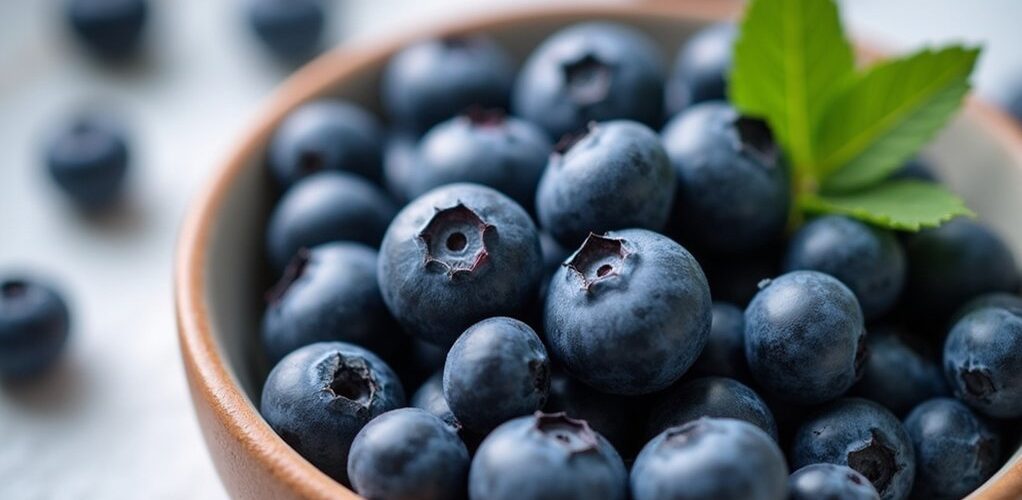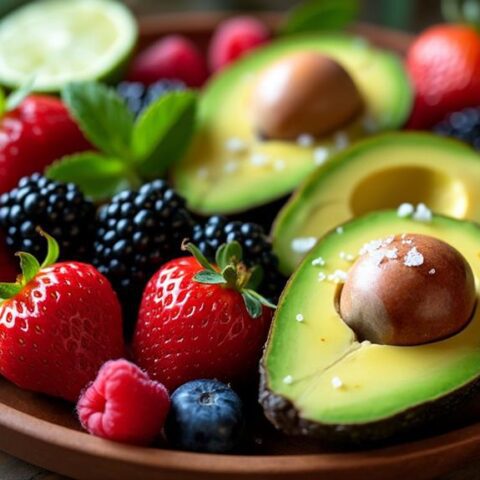
Blueberries contain moderate carbohydrates, with one cup providing 21.5 grams of total carbs and 18 grams of net carbs. While higher in carbs than raspberries or blackberries, they offer significant health benefits through antioxidants and vitamins. For low-carb diets, portion control is essential, with a recommended serving of 1/4 to 1/2 cup of fresh berries. Dried blueberries should be avoided due to concentrated sugars. Understanding proper portions and alternatives can help incorporate these nutritious berries into various dietary plans.
Key Takeaways
- Blueberries contain moderate carbs with 18 grams net carbs per cup, making them higher in carbs than other berries like raspberries or strawberries.
- Fresh blueberries can fit into low-carb diets when limited to 1/4 or 1/2 cup portions, especially for ketogenic diet followers.
- Dried blueberries should be avoided on low-carb diets, as they contain five times more carbs than fresh blueberries.
- Blueberries have a glycemic index of 53, indicating a moderate impact on blood sugar levels.
- Alternative berries like raspberries (5g net carbs) and strawberries (8g net carbs) per cup are better low-carb options.
Understanding Blueberry Carbohydrate Content
Many health-conscious individuals find it essential to understand the carbohydrate content of blueberries when incorporating them into their dietary plans.
When examining the nutritional profile, one cup of raw blueberries contains 21.5 grams of total carbs, including 3.5 grams of fiber, resulting in 18 grams of net carbohydrates. For those following a low-carb diet, a more moderate serving size of 1/2 cup provides 11 grams of total carbs and 9 grams of net carbohydrates, making portion control vital.
With a glycemic index of 53, blueberries have a moderate impact on blood sugar levels.
It's important to note that dried blueberries contain considerably higher carbohydrates, with 48 grams per 1/2 cup, making them less suitable for carb-conscious eating plans.
Net Carbs vs. Total Carbs in Blueberries
When calculating carbohydrate intake from blueberries, understanding the distinction between total carbs and net carbs becomes vital for accurate dietary planning.
Raw blueberries contain approximately 21.5 grams of total carbs per cup, with 3.55 grams of fiber, resulting in 18 grams of net carbs. For those following a keto diet or low carb lifestyle, a more moderate portion of 1/2 cup provides 12 grams of total carbs and 9 grams of net carbs.
Raw blueberries offer balanced carb options, with one cup containing 21.5g total carbs and 18g net carbs after accounting for fiber.
It's important to note that dried blueberries have substantially higher carbohydrate content, with 48 grams of total carbs and 43 grams of net carbs per 1/2 cup serving.
Due to these variations, portion control plays a significant role in maintaining carbohydrate restrictions while enjoying blueberries as part of a balanced diet.
Blueberries on Different Low-Carb Diets
Different low-carb diets accommodate blueberries in varying amounts, depending on their specific carbohydrate restrictions and nutritional goals.
On a ketogenic diet, raw blueberries must be carefully portioned, typically limiting intake to one-quarter or one-half cup to maintain ketosis, given their 12 grams of net carbs per cup.
Less restrictive low-carb diets may allow for slightly larger portions, but portion control remains essential due to blueberries' moderate glycemic index of 53.
While raw blueberries can fit into most low-carb eating plans, dried blueberries and processed products like jellies and juices should be avoided, as their concentrated sugar content can quickly exceed daily carbohydrate limits.
The key is balancing blueberry consumption with other low-carb foods to stay within target ranges. Additionally, the ketogenic diet greatly reduces blood glucose levels, which can be beneficial for those managing type 2 diabetes.
Fresh vs. Dried Blueberries: Carb Comparison
Although fresh and dried blueberries come from the same fruit, their carbohydrate content differs dramatically due to the dehydration process.
Fresh blueberries contain 11 grams of total carbohydrates and 2 grams of fiber per half-cup serving, yielding 9 grams of net carbs. In contrast, dried blueberries pack a much higher carbohydrate punch, with 48 grams of total carbohydrates and 5 grams of fiber, resulting in 43 grams of net carbs per half-cup serving.
The dramatic difference between fresh and dried blueberries is clear: dried contains nearly five times the net carbs of fresh per serving.
For those following a keto diet, this distinction is significant. While fresh blueberries can be consumed in moderation, the concentrated sugar content in dried blueberries makes them challenging to incorporate into low-carb eating plans.
Careful portion control becomes essential, as even small amounts of dried blueberries can quickly exceed daily carbohydrate limits.
Health Benefits Beyond the Carb Count
While blueberries' carbohydrate content is important for those monitoring their intake, these fruits offer significant health benefits through their rich antioxidant properties, particularly anthocyanins that combat harmful free radicals in the body.
The fiber content in blueberries supports digestive health while contributing to heart protection through its role in cholesterol management and blood pressure regulation.
Research indicates that regular consumption of blueberries can help maintain healthy blood sugar levels, making them a valuable addition to a balanced diet despite their carbohydrate content.
Antioxidant Power for Health
Beyond their carbohydrate content, blueberries stand out as a powerhouse of antioxidants, particularly anthocyanins, which give these berries their distinctive blue-purple hue.
Research shows these compounds actively combat oxidative stress and inflammation, while supporting overall wellness through multiple pathways.
These small fruits deliver impressive health benefits, with scientific studies highlighting their positive impact on cardiovascular and cognitive function:
- Contains vitamin C at 16% of daily needs per 100-gram serving, supporting immune health
- Demonstrates superior antioxidant capacity compared to many other fruits
- May help reduce blood pressure and lower LDL cholesterol levels
- Shows potential in improving brain function and protecting against age-related cognitive decline
At just 57 calories per 100-gram serving, blueberries offer these health advantages while remaining relatively low in energy content.
Fiber and Heart Protection
The fiber content in blueberries adds significant value to their nutritional profile, particularly for cardiovascular health. With 2.4 grams of fiber per 100-gram serving, blueberries support both digestive wellness and heart protection while remaining suitable for a low-carb diet.
| Benefit | Impact |
|---|---|
| Fiber Content | Aids digestion, regulates blood sugar |
| Heart Health | Reduces cardiovascular disease risk |
| Blood Pressure | Lowers through anthocyanin content |
| Cholesterol | Improves levels naturally |
The antioxidant properties of blueberries, particularly their rich anthocyanin content, work synergistically with fiber to enhance cardiovascular health. These compounds help maintain healthy blood pressure levels while supporting ideal cholesterol balance, making blueberries an essential addition to a heart-conscious diet.
Portion Control and Serving Sizes
Managing portion sizes of blueberries plays an important role in maintaining balanced carbohydrate intake, particularly for individuals following specific dietary plans. A half-cup serving contains approximately 11 grams of total carbohydrates and 9 grams of net carbs, making portion control vital for those on low-carb diets.
Careful monitoring of blueberry portions helps balance carb intake, with a half-cup serving providing 11 grams of total carbohydrates for low-carb dieters.
- Raw blueberries (1/2 cup) provide 2 grams of fiber and 9 grams net carbs
- Full cup servings contain 21.5 grams of total carbohydrates
- Keto dieters should limit intake to 1/4-1/2 cup to maintain ketosis
- Dried blueberries have considerably higher carb content at 48 grams per 1/2 cup
Accurate measurement of serving sizes enables individuals to incorporate blueberries into their diet while adhering to their carbohydrate goals, ensuring they can enjoy the fruit's benefits without exceeding their daily limits.
Blueberries vs. Other Low-Carb Fruits
When comparing berries for a low-carb diet, blueberries contain notably more net carbohydrates than their counterparts, with 12 grams per cup versus 5-6 grams in similar portions of raspberries and blackberries.
Strawberries present another excellent alternative for carb-conscious consumers, offering just 6 grams of net carbohydrates in a half-cup serving, while still providing essential nutrients and antioxidants.
Those following ketogenic or low-carb diets should consider choosing raspberries, blackberries, or strawberries more frequently than blueberries, particularly avoiding dried blueberries which pack a concentrated 43 grams of net carbs per half cup.
Comparing Net Carb Content
Understanding how blueberries stack up against other low-carb fruits reveals important distinctions for those monitoring their carbohydrate intake.
While blueberries contain 12 grams of net carbs per cup, making them relatively high in carbs, other berries offer more keto-friendly fruit options.
For those seeking better alternatives, portion control becomes essential when incorporating blueberries into a low-carb diet due to their sugar content.
- Raspberries and blackberries lead the pack with only 5 grams of net carbs per cup
- Strawberries present a moderate option at 8 grams of net carbs per cup
- Fresh blueberries contain 12 grams of net carbs per cup
- Dried blueberries pack a substantial 43 grams of net carbs per half-cup
When comparing berries for a low-carb lifestyle, understanding these variations helps make informed dietary choices.
Health Benefits Between Fruits
Beyond their carbohydrate content, comparing the nutritional profiles of various berries reveals distinct health advantages.
While blueberries are rich in antioxidants and provide valuable nutrients, their higher sugar content means they may not be the best choice for those following strict low-carb diets.
Other berries, particularly raspberries and blackberries, offer similar health benefits while containing fewer net carbs and more fiber per serving.
These alternative low-carb fruits deliver comparable antioxidant properties, especially anthocyanins that help fight inflammation and oxidative stress.
The higher fiber content found in raspberries and blackberries also supports digestive health more effectively than blueberries.
For those prioritizing both nutritional benefits and carbohydrate restriction, these alternatives provide a more balanced approach to maintaining ketosis while still enjoying the protective effects of berry consumption.
Best Keto Berry Choices
Although blueberries offer significant nutritional benefits, their higher carbohydrate content makes them a more challenging choice for strict ketogenic dieters compared to other berries.
When selecting keto-friendly fruits, understanding net carbs becomes essential for maintaining ketosis. While blueberries contain 12 grams of net carbs per cup, other berries provide better options for carb-conscious individuals.
- Raspberries and blackberries contain only 5-6 grams of net carbs per serving
- Strawberries offer a lower-carb alternative with higher fiber content
- Fresh blueberries can fit into a keto diet when limited to 1/2 cup portions
- Dried blueberries should be avoided due to concentrated sugar content
For those following a ketogenic lifestyle, focusing on lower-carb berries while practicing portion control with blueberries guarantees ideal adherence to dietary goals.
Strategic Ways to Include Blueberries
When following a ketogenic diet, incorporating blueberries requires thoughtful planning to maintain the delicate balance of carbohydrate intake. The key lies in portion control, limiting consumption to 1/2 cup (74 grams) of fresh or frozen blueberries, which contains approximately 9 grams of net carbs. To maximize enjoyment while staying within keto guidelines, consider adding blueberries to low-carb smoothies or combining them with healthy fats like full-fat Greek yogurt. Strategic placement of blueberries as toppings on salads or keto-friendly desserts allows for their natural sweetness without compromising ketosis. Always choose fresh or frozen varieties over dried blueberries, as the latter contains concentrated sugars that can quickly exceed daily carb limits. This measured approach guarantees the nutritional benefits of blueberries while maintaining ketogenic dietary goals. Regular monitoring of blood sugar and ketones is crucial during the keto diet adjustment phase to avoid hypoglycemia.
Nutritional Profile and Glycemic Impact
Fresh blueberries offer a balanced nutritional profile with 9 grams of net carbs per half-cup serving, making them a viable option for those monitoring their carbohydrate intake.
The glycemic index score of 53 places blueberries in the moderate range, indicating they won't cause dramatic spikes in blood sugar levels when consumed in appropriate portions.
While dried blueberries contain considerably more carbohydrates at 24 grams per half cup, fresh blueberries provide essential nutrients and antioxidants while maintaining a more favorable impact on blood sugar levels.
Net Carbs Per Serving
Blueberries offer a moderate carbohydrate profile that varies greatly based on serving size and preparation method.
Understanding net carbs in blueberries is essential for those following a keto low-carb diet, with fresh berries containing considerably fewer carbs than their dried counterparts.
A standard one-cup serving of raw blueberries contains 18 grams of net carbs, while a half-cup portion provides 9 grams, making moderate amounts more suitable for carb-conscious individuals.
- Raw blueberries (1 cup): 21.5g total carbs, 18g net carbs
- Raw blueberries (1/2 cup): 11g total carbs, 9g net carbs
- Dried blueberries (1/2 cup): 48g total carbs, 43g net carbs
- Recommended serving for keto diet: 1/4 to 1/2 cup fresh blueberries
Blood Sugar Response Levels
Understanding blood sugar response levels requires careful consideration of blueberries' glycemic impact, which falls within the moderate range at 53 on the glycemic index (GI) scale. Though blueberries contain natural sugars and carbohydrates, their effect on blood sugar is moderated by their fiber content and beneficial compounds.
| Factor | Impact | Benefit |
|---|---|---|
| Glycemic Index | Moderate (53) | Controlled blood sugar rise |
| Fiber Content | 2.4g/100g | Slows sugar absorption |
| Carbohydrates | 14.5g/100g | Provides steady energy |
| Anthocyanins | High | Improves insulin sensitivity |
The presence of anthocyanins and other antioxidants in blueberries may help enhance insulin sensitivity, making them a suitable choice for individuals monitoring their blood sugar levels, despite their carbohydrate content.
Seasonal Availability and Storage Tips
Although many enjoy these antioxidant-rich berries year-round, peak season for harvesting occurs during the height of summer, specifically July and August.
Understanding seasonal availability and proper storage methods helps maximize both freshness and value when purchasing blueberries. When storing fresh blueberries, refrigeration in a breathable container can maintain quality for up to two weeks, while freezing extends shelf life considerably, lasting up to a year in airtight containers.
Smart storage extends blueberry freshness – two weeks when refrigerated properly, up to a year when frozen in airtight containers.
Key storage guidelines to remember:
- Store unwashed berries in the refrigerator and only wash them just before consumption
- Use breathable containers for fresh storage to prevent moisture buildup
- Freeze berries in single layers before transferring to storage containers
- Check dried blueberry packages for added sugars, as they may affect carbohydrate content
Research-Backed Benefits of Blueberries
Scientific research has consistently demonstrated the remarkable health benefits of these small but mighty berries, positioning them as a leading superfood in modern nutrition.
Multiple studies highlight blueberries' research-backed benefits, particularly their rich antioxidant content, which helps combat harmful free radicals and reduce inflammation. Their impressive nutrient profile, including vitamins C and K, supports immune function and bone health, while maintaining a low net carb count that makes them suitable for various dietary approaches.
Research shows that regular blueberry consumption positively impacts heart health by lowering blood pressure and reducing LDL cholesterol levels.
Additionally, these berries have demonstrated significant potential in enhancing cognitive function and protecting against age-related mental decline, making them a valuable addition to a health-conscious diet.
Alternative Berry Options for Low-Carb Diets
For individuals following low-carb or ketogenic diets, several berry alternatives offer similar nutritional benefits to blueberries while maintaining considerably lower carbohydrate counts.
When comparing net carbs, raspberries emerge as the lowest-carb option with just 5 grams per ¾ cup serving, followed by blackberries and strawberries at 6 grams each. These alternatives provide excellent options for maintaining ketosis while enjoying fresh fruit flavors.
- Raspberries contain 40% fewer net carbs than blueberries
- Blackberries offer high fiber content, reducing their net carb impact
- Strawberries provide versatility in both sweet and savory dishes
- All three berries can be enjoyed fresh or frozen year-round
These low-carb berries can be incorporated into various meals and snacks, allowing for greater portion sizes while staying within daily carbohydrate limits on a ketogenic diet. Avocados contain only 1.5 grams of net carbs per fruit and are rich in monounsaturated fats that promote heart health, making them another excellent option for those on a low-carb diet.
Frequently Asked Questions
Can I Eat Blueberries on a Low-Carb Diet?
Blueberries can fit into a low-carb diet when practicing portion control. Their glycemic index and nutrition benefits make them diet-compatible when limited to 1/2 cup servings for healthy snacking.
Which Berry Has the Lowest Carb?
Among berry varieties, raspberries offer the lowest carb content at 3 grams net carbs per 1/2 cup serving, making them an ideal choice for low carb diets and glycemic index considerations.
Are Blueberries Good or Bad Carbs?
Blueberries contain good carbs due to their antioxidant properties and health benefits. With a moderate glycemic index of 53, they're nutritious when consumed with portion control, making them suitable for balanced recipes.
How Many Blueberries to Eat a Day?
A recommended daily serving of 1/2 cup (74g) blueberries provides ideal antioxidant benefits while maintaining portion control. This amount delivers essential nutrients and supports weight management without excessive carbohydrate intake.
Conclusion
While blueberries contain natural sugars and carbohydrates, they can still fit into a low-carb lifestyle when consumed mindfully. Their exceptional nutritional profile, including fiber, antioxidants, and vitamins, makes them a valuable addition to most diets. For those following strict ketogenic protocols, smaller portions or lower-carb berry alternatives may be preferable, but moderate consumption of blueberries can support overall health goals while satisfying sweet cravings naturally.










No Comments